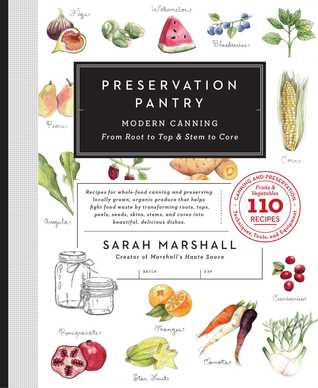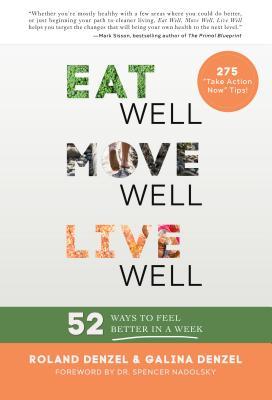Eat Well Move Well Live Well by Roland & Galina Denzel
I thought this book would be more interesting than it was. To be fair though, it's designed to read one tip per week and focus on that integrating that tip into your life that week in the hopes that after a year you'll have 52 ways to eat, move, and live better. I checked this out from the library, so I can't keep it for a year! I did read it from front to back and there were tips that I liked and made sense, but there were some that in my opinion were pretty out there - get rid of your couch and sit on the floor all the time, no thanks. Overall, a good way to incorporate small changes to your life and you don't have to read it front to back you could pick out chapters/areas that you want to change/focus on.
Moonglow by Michael Chabon (Books & Banter book club)
I've never read anything by Michael Chabon before and wouldn't have read this one if not for my book club. If it wasn't for book club I probably would have quit after the first 50 pages, but it did get a little better about halfway through. This "fictional memoir" follows "Mike" as he spends time with his grandfather at the end of his life. For whatever reason his grandfather feels compelled to tell Mike a series of fragmented stories from his life. Mike's grandfather was brilliant, but also a constant troublemaker even into adulthood. He grew up poor, served during WWII, spent time in prison, and dealt with a mentally ill wife. He was definitely a character and if half of what he said is true he had an adventuresome life.
I didn't really like this book - I didn't like the format of "fictional memoir" that was not in anyway told chronologically. There was also a lot of seemingly random sexual or vulgar parts that seemed to be thrown in for no reason at all. While the writing was good, I just didn't love the story and it was very hard to get into. I don't think I'll be reading anymore Chabon in the future.

To the Bright Edge of the World by Eowyn Ivey (Evening Edition book club, re-read)
I loved The Snow Child, so I couldn't wait to read this one and saved it to take on vacation. While it's very different from The Snow Child, there are some similar elements and I really liked it.
Allen Forrester has the opportunity of a lifetime to lead a small group of men up the Wolverine River and into uncharted Alaskan territory. While this is the adventure of a lifetime he will be leaving behind his newly pregnant wife Sophie. Sophie is not thrilled about living in army barracks for up to a year with little to no word from her husband - not knowing if he will come back to her. Told exclusively in letters and diary entries from both Allen and Sophie, their stories even though hundreds of miles apart continue to intersect through strange coincidences or magic - however you choose to see it. While Allen is away Sophie delves into the new art and science of photography to fill her time. This new hobby will completely change her life in unseen ways. Meanwhile at times Allen's group struggles to survive in the harsh Alaskan wilderness and much of what they experience can't be explained rationally or scientifically. Like Ivey did in The Snow Child, there is a fine line between reality and magic that is often blurred and many events could be seen either way. While this book does start slow, it holds your attention and you can't wait to see if Allen and his men will survive their journey and make it back to Sophie. And as someone who is childfree, I like that in both her books the main characters don't have children. In the late 1800's when this book takes place that would have been a devastating circumstance, but only because of it is Sophie able to do all she does at the end of the book. While in both this book and The Snow Child, being childless is not their choice, the author shows that in both cases the characters have fulfilling lives and marriages. I highly enjoyed this one!
Re-read for book club and loved it EVEN MORE the second time! This time because I knew the storyline I was able to read it a little slower and really see a lot of the details that I might have missed the first time. I also marked all the pages with raven references as I was reading because the first time I was about halfway through the book and wished I had done that. Such a beautiful and well-written story. I can't wait to see what Ivey writes next!
Some quotes I really liked this time:
"It made me uneasy. I have no desire to bring Sophie into such low talk. How could I tell of her intelligence, her humor, her gentleness, to a man like this? She is too good for his ears." (p. 57)
"There was something diminishing about the conversation, too, as if suddenly we had become only, collectively, and forever Mothers, with no room for an entire individual." (p. 89)
"You are by no means naive or unwitting, yet somehow you still find beauty in each day. It is a gladdening thought, & one that saves me just now...I can find no means to account for all that we have witnessed, except to say that I am no longer certain of the boundaries between man & beast, of the living & the dead. All that I have taken for granted, what I have known as real & true, has been called into question. I am certain only of this - I come home to you in love." (p. 378)

The Potlikker Papers by John T. Edge
I wasn't sure what to expect with this book, but I LOVED it. As Edge describes "potlikker" was the broth left after a pot of greens was cooked - the slave owners ate the greens, leaving the potlikker for the slaves - not knowing the potlikker was nutrient rich and the better product. Today in the South potlikker has been reclaimed by chefs using it in new and unique ways, as well as celebrating it's history. This book explores the history of the South through food, starting with the pivotal roles cooks and waiters played in the civil rights movement. Then decade by decade Edge shows trends in Southern food and how they reflected the changing culture of the South. A very interesting and incredibly informative book about the culture and food of the South. A must-read for any Southerner or fan of Southern food!
Some quotes I really liked:
"To apprehend how Southerners have fed themselves and others gains us a necessary glimpse of remarkable lives, a kitchen-eye view of the revolutions and evolutions that have shaped the region. Those stories reveal a people's history, embedded in the crops we grow, the dishes we cook, and the tables where we gather. In these Potlikker Papers, complex narratives reveal how and why Southern food has become a shared culinary language for a nation now fixed on finding new meaning in its meals." (p. 11)
"Through television shows and books, [Nathalie] Dupree argued that Southern cooking should be considered a cuisine. 'People go all the way to Italy to study how to make pasta with Giuliano Bugiatti,' said the woman who, in the 1960s, had gone all the way to London to learn how to stew a proper coq au vin. He moves his hands, she said, in the same way a Southern cook shapes biscuit dough. 'It's just that no one ever bothered to say that making Southern biscuits was a technique worth learning.'" (p. 203)
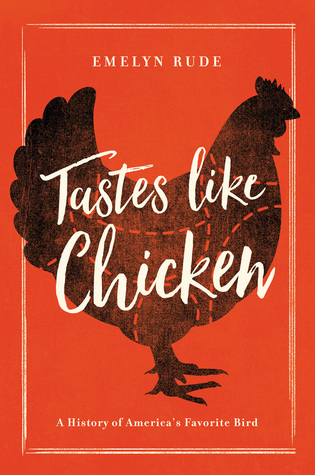
Tastes Like Chicken by Emelyn Rude
I assumed this would be another book about the industrial chicken industry and all its evils. But, Emelyn Rude takes a different look at the chicken. She looks at chicken as a food source and how much that has changed over the years. Chicken was seen as food only for sick or ailing people in the 1800's, while beef was for "strength" or healthy people. Then during slavery in the American South, chickens weren't considered "livestock" so slaves could own them and then chicken became associated with slavery and poverty. Only when the chicken industry became industrialized between the 1940's and 1960's did chicken become more widely available and consumed in America. Rude only focuses on the evils of the modern day chicken industry in the last chapter and I wish there had been one more chapter to show the other side - small farm pastured chicken/poultry. Overall, an interesting look at how eating chicken has changed over time in the American culture.
Some quotes I liked:
"Like their English forebears, Americans were unafraid of letting their livestock take the stand and bear testimony in criminal proceedings. In 1876 a black woman in Virginia was accused of stealing chickens. As part of the prosecution, the mother of the chickens in question was brought to court to see if she could identify those birds as her offspring. The biddy somehow managed to convince those present, beyond a reasonable doubt, that she recognized that those were indeed her progency that were stolen. As a result of the hen's testimony, the human defendant received thirty-nine lashes." (p. 36-7)
"By the end of the 1940's, almost all of the broilers in the United States were raised in complete confinement, a practice that was incredibly effective in achieving its aims of efficiently producing very cheap meat. By 1955 the average time required to raise one thousand birds to maturity was just forty-eight man hours, as opposed to the average of two hundred and fifty in 1940." (p. 142)
"Further scientific investigation ensued and researchers found that while B12 was indeed essential to a happy chicken, the antibiotic residues affixed to them were veritable chicken Miracle-Gro. When fed antibiotics, the birds required less feed, grew fatter faster, and the mortality rate dropped sharply. Farmers were ecstatic - the discovery was heralded as 'the Biggest Feeding News in 40 years!' - and within the next two decades every single commercially produced chicken in the United States was supplemented with antibiotics." (p. 144)
"If humans grew as fat as fast as a modern chicken, a 6.6 pound human baby would reach 660 pounds in just two months." (p.183)
"According to one survey of the broiler industry, a typical grower in 1995, 'had been raising chickens for fifteen years, owned three poultry houses, remained deeply in debt, and earned perhaps $12,00 a year.' Unfortunately, not much has changed in the time since. Today the median-income poultry farmer owns between three and five chicken houses, produces some 483,600 broilers each year, and lives below the poverty line." (p. 186)
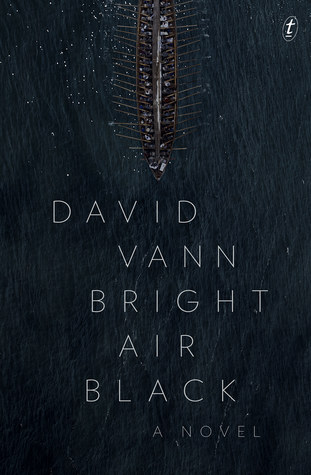
Bright Air Black by David Vann
I remember reading Medea in high school and loving this quote so much that my parents put it in my Senior page of the yearbook for me: “Let no man think me a weak, frail-hearted woman, no let them know me for the opposite of that...it is lives like this that are longest remembered.” So, when I saw this book that's a re-telling of Medea from her perspective I knew I had to read it. In Bright Air Black Medea is "a slayer of kings who wants a world not ruled by men." Medea sees the men in her world rise to the top by being ruthless warriors, but when she tries to escape the confines of being a woman by doing the same thing she is scorned and seen as crazy. She thinks that Jason is the solution - she will set it up for him to be king and will rule through him. But Jason is weak and leaves Medea for another woman - and Medea is not someone to be scorned. Medea's "burn down the ground" approach will exact her revenge on Jason and make her a legendary villain.
This is not as easy book to read - there is a LOT of violence and brutality. Definitely not a good time to be a woman or really anyone, but women were always on the verge of being sold, given away, kicked aside, used, etc. Medea acting on her own desires for power and control would be seen as great qualities in a man, but as a woman in that time period she had no hope of rising above her prescribed role. Despite the violence, I wanted to see what would happen as Medea's story unfolds, but I would have a hard time recommending this one because it was so brutal. Definitely a unique book that re-casts Medea as a woman ahead of her time, not just a ruthless villain.
Some quotes I liked:
"What Medea believes is this: that there are no gods. There is only power, and to hold power, you have to be descended from a god. In the end, this is the same thing. When you have that power, you do become a kind of god...Gods do what cannot be done. And a woman can become a god easily because she is not allowed anything. She can become a thing of fear." (p. 21)
"She will be made anything today, slave or whore or friend of the king, with slaves beneath her. She will be killed or whipped or bathed and dressed and honored with a feast, all at the whim of one man she has never met, and she has no say over what will happen to her children." (p. 213)
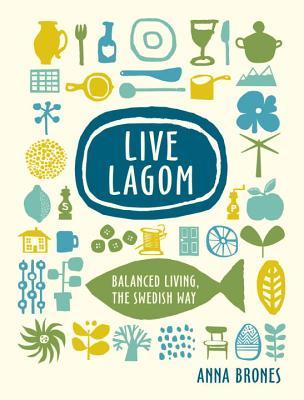
Live Lagom: Balanced Living, the Swedish Way by Anna Brones
The last lagom book I read was pretty lacking, but this one is much better! Anna Brones gives a great introduction to the Swedish concept of lagom, "In a chaotic, modern world, this all feels like a breath of fresh air. We're craving more balance, more equality, more simplicity. We're looking for something that's often hard to put an exact name to, but it's a feeling of contentedness, of having just the right amount of things, the right amount of time." (p. 12) She also explains how lagom can sometimes have a darker side where people use it to keep people in line with cultural expectations or to discourage ambition. But, overall lagom can really help if you apply it to all aspects of your life. In this book she covers work, home, health, and the environment. There are also lots of beautiful photos and in the "home" section there are quite a few recipes included. This was more what I was expecting after all the hygge books - a really beautiful book that explores the idea of lagom and how anyone can apply the ideas to their own life. There is a renewed popularity with minimalism right now, but the idea of lagom resonates much more with me because it's a middle ground - not minimalism or extreme consumerism, but the balance in the middle. Definitely a book worth reading.
Some quotes I really liked:
"In modern Western culture, being busy has come to define us - the socially acceptable pastime. It comes with an underlying assumption that if we're busy, with our schedules packed to the brim, then we must be important, our lives must have meaning and purpose. We use busy as a plaster to cover up the real question that we're all afraid of asking: if we are not busy, then who are we? The truth is that we're too busy to take a step back and ask ourselves: what exactly are we busy with? Sometimes we've got a work schedule full of deadlines and it's hard to get around that. But more often than not, we're filling up our time off with a multitude of activities instead of taking the time to just exist." (p. 68)
"Think how easy it is to look at Facebook, and all of a sudden half an hour has gone by. Or how easy it is to come home after a long day at work and watch an episode of a television series. That episode quickly turns to another one, and then another one. Suddenly several hours have passed. What could we have done with that time instead? Sometimes we need to indulge in these activities, but I am certain that the majority of us spend far more time doing them than we should - definitely not a lagom amount." (p. 71)
"One could argue that the Swedish art and craft scene is a representation of the Slow Art, art that preserves the tradition of craft and puts a value on the time and energy spent to make something well...When we honor art and craft in this way, it is a reminder that in modernizing, we don't need to throw out the lessons and traditions of the past...Today, there is a new generation of women and men taking back these traditionally female crafts [like knitting and weaving], helping to revive the art forms and give credit to the women rarely honored for their work and creativity." (p. 113-4)

Jesus Feminist: an Invitation to Revisit the Bible's View of Women by Sarah Bessey
I had heard of this book, but hadn't read it because many Christian books about feminism are disappointing. My husband forwarded me a blog post by Sarah Bessey and I decided to read her book. While parts of it were good, it was a little too flowery for lack of a better word. She grew up in a much more charismatic church, so I think that her writing reflected that and sometimes it could seem like she was glossing over stuff with over-the-top descriptions. But, I did like that in the first half of the book she addresses really well Biblical passages that are commonly misunderstood or misapplied. She also does a great job of really showing how Jesus viewed and treated women, which was beyond radical for that day, but today it seems normal and is not viewed in the truly radical way that it was intended. The second half of the book is where I struggled more because she kind of vaguely shows how women can impact the Church today in a variety of ways, but it wasn't very clear. I just didn't connect as much with the second half of the book. But, overall a good explanation of Biblical feminism.
Some quotes I really liked:
"As Canadian theologian Dr. John G. Stackhouse Jr. says, 'Christian feminists can celebrate any sort of feminism that brings more justice and human flourishing to the world, no matter who is bringing it, since we recognize the hand of God in all that is good.'" (p. 13)
"Both sides [of the egalitarian vs complementarian view] can treat the Bible like a weapon. On both sides, there are extremists and dogmatists. We attempt to outdo each other with proof texts and apologetics, and I've heard it said that there is no more hateful person than a Christian who thinks you've got your theology wrong." (p. 15)
"Jesus often practiced the redemptive movement himself in the Gospels, showing how the Spirit moves the people of God (and therefore, eventually even humanity) further along toward his full intention. Jesus would teach or quote a portion of the Law and then move us forward from our current place toward God's original intent." (p. 27)
"Often when a woman exhibits leadership, she's accused of having that Jezebel spirit. I look forward to the day when women with leadership and insight, gifts and talents, callings and prophetic leanings are called out and celebrated as a Deborah, instead of silenced as a Jezebel." (p. 92)
